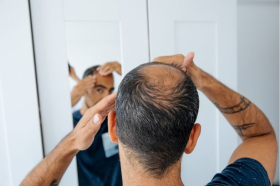
Unraveling the Mystery of Hair Loss: Exploring its Causes and Contributing Factors
Hair loss, or alopecia, is a prevalent condition that affects people across different age groups, genders, and ethnicities. It can have a profound impact on an individual’s self-esteem, confidence, and overall well-being. Genetics, hormonal changes, medical conditions, stress, lifestyle choices, nutritional deficiencies, and aging all play a role in the onset and progression of hair loss. Understanding these factors is crucial for individuals seeking to address their hair loss concerns effectively.
Genetics and Hormonal Factors
Genetics play a significant role in hair loss, with hereditary factors accounting for the majority of cases. Androgenetic alopecia, commonly known as male or female pattern baldness, is an inherited condition that results in progressive hair thinning and balding. Hormones, particularly dihydrotestosterone (DHT), play a crucial role in this type of hair loss. DHT miniaturizes hair follicles, leading to the production of thinner, shorter hair strands until they eventually stop producing hair altogether.
Medical Conditions and Treatments
Certain medical conditions and their treatments can contribute to hair loss. Conditions such as thyroid disorders, autoimmune diseases (e.g., alopecia areata), and scalp infections can disrupt the hair growth cycle, leading to hair shedding or thinning. Additionally, undergoing chemotherapy or radiation therapy for cancer treatment can cause temporary hair loss, as these treatments target rapidly dividing cells, including hair follicles.
Hormonal Changes
Fluctuations in hormone levels can trigger hair loss in both men and women. For example, hormonal imbalances during pregnancy or after childbirth can lead to excessive hair shedding, known as postpartum telogen effluvium. Similarly, women approaching menopause may experience hair thinning due to hormonal shifts, specifically decreased estrogen levels. Hormonal changes can disrupt the hair growth cycle and result in temporary or prolonged hair loss.
Stress and Lifestyle Factors
Chronic stress, both physical and emotional, can contribute to hair loss. Stress triggers a condition called telogen effluvium, in which hair prematurely enters the resting phase (telogen), leading to increased shedding. Factors such as work pressure, emotional trauma, crash diets, or sudden weight loss can contribute to this type of hair loss. Additionally, unhealthy lifestyle choices like poor nutrition, smoking, excessive alcohol consumption, and inadequate sleep can impact hair health and contribute to hair loss.
Nutritional Deficiencies
A well-balanced diet is essential for healthy hair growth. Nutritional deficiencies, such as insufficient intake of vitamins (particularly B vitamins), minerals (such as iron and zinc), and proteins, can impair the hair follicles’ ability to produce strong and vibrant hair strands. Deficiencies can result from poor dietary choices, restrictive diets, or underlying medical conditions that hinder nutrient absorption.
Hairstyling Practices and Hair Products
Excessive use of heat styling tools (e.g., flat irons, curling irons), tight hairstyles (e.g., braids, ponytails), and harsh chemical treatments (e.g., perming, coloring) can cause hair breakage and weaken the hair shaft. Furthermore, the use of certain hair products containing harsh chemicals, like sulfates and parabens, can irritate the scalp, leading to inflammation and subsequent hair loss.
Age and Natural Aging Process
Hair thinning and loss are a natural part of the aging process. As individuals age, the hair growth cycle slows down, resulting in shorter growth phases and longer resting phases. This leads to reduced hair density and the appearance of thinner hair. Additionally, aging can affect the health and functioning of hair follicles, impacting their ability to produce strong and robust hair strands.
In conclusion, hair loss is a complex and multi-faceted condition with various causes and contributing factors. By identifying the underlying cause and seeking appropriate treatments or lifestyle modifications, individuals can take proactive steps towards managing and potentially reversing hair loss, restoring their confidence and quality of life. Consulting with healthcare professionals or specialists in hair restoration can provide valuable guidance and personalized solutions for those experiencing hair loss.
Clients are encouraged to contact Glojas directly for a free initial consultation. Our experienced consultants will gladly provide assistance and advice on how to approach your specific challenge.